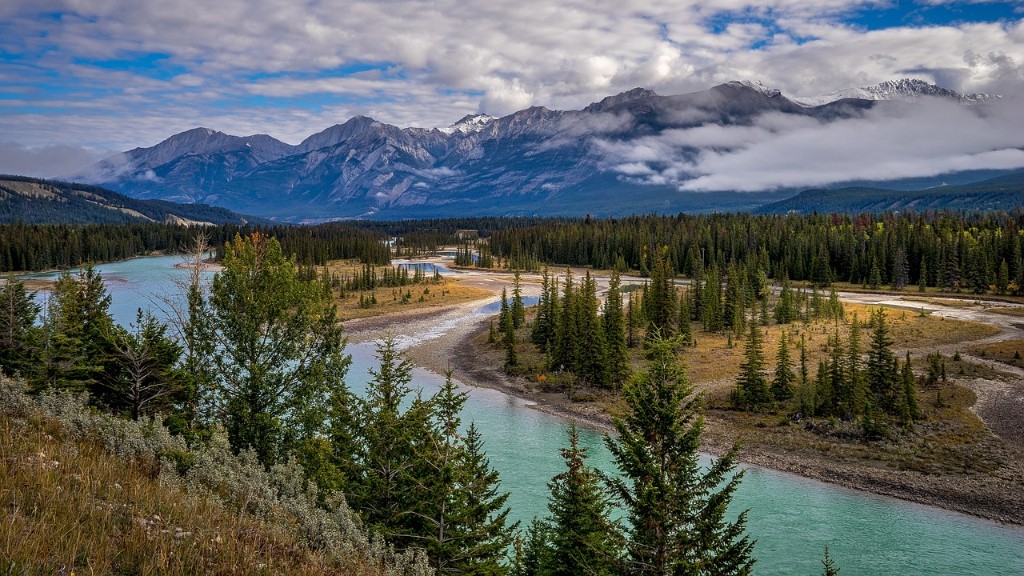The Nile River was, and still is, one of the most important geographic features in the world. Located in the north-eastern region of Africa and stretching from Sudan to the Mediterranean Sea, this majestic river shaped the development of ancient Egyptian civilization. The incredible influence of the Nile in Egyptian culture and development is due to the many geographic features and benefits it provides.
The Nile provided a wide range of resources to the ancient Egyptians. Its many canals and tributaries provided access to vital land for the growing agricultural industry. The prevalence of the warm climate enabled year-round crop cultivation and the mineral-rich flood plains provided added nutrients for the soil. In addition, the vast bodies of water along the river offered easy access to freshwater and enabled the Egyptians to build their extensive network of irrigation canals. The Nile was also the main passage for trade and transportation between the countries along its banks, allowing further commerce and cultural exchange.
Alternating between seasonal flooding and low waters, the Nile had a massive impact on the development of the ancient Egyptians. In the time of low water, the lush landscape surrounding the river allowed the Egyptians to move freely and build thriving communities. During the times of flooding, the water was used to replenish the land, depositing rich soil which allowed civilizations to build larger and more complex cities. Geographer Walter Langer describes the inundation of the Nile river “as if the river was giving birth twice a year to a new world.”
In addition to its geographic benefits, the Nile also played an important role in Egyptian mythology. The powerful river was venerated as a god and worshiped as a source of life. Often at the center of religious ceremonies and festivals, the Nile was credited with the fertility of the land and the winning of wars. Deeply rooted in their culture, the Egyptians held the Nile in high esteem, believing that it connected them to their gods.
The Nile was undoubtedly an integral part of Ancient Egyptian life, culture, and history. It shaped the culture, provided additional resources, and its floodwaters replenished the land. Even today, the Nile River has a presence in Egyptian culture as it continues to influence agricultural practices and provide sustenance to the population.
Social Impact
Ancient Egyptian civilization was built on many institutions and religious traditions. One of the most fundamental aspects of the culture was the existence of the Nile river. It provided not just the means to live but also an identity and a culture. In general, Egyptians revered the Nile as a source of life and well-being, evident by many of their ancient hymns praising the great river.
The Nile’s geographic characteristics helped shape the way people interacted with one another. Its water provided security and stability, so it was only natural for Egyptians to congregate along its banks. This created a strong sense of community and allowed for the emergence of cities and villages, which then formed the basis for social interactions and political systems.
Egyptians often included their gods in these interactions. As the river was believed to bring salvation, wisdom, and fertility to the people, Nile gods and goddesses became significant parts of the culture. In many ways, this religious connection added to the importance of the Nile, as it was seen as the bridge between the human and divine worlds.
The Nile shaped Egyptian society in many ways. It was a source of food, a medium of transportation, and even a cultural symbol. Its waters gave rise to the development of cities, trade networks, and the spread of knowledge, creating a powerful bond between people and nature.
Political Effects
Early Egyptian kings sought to control the powerful waters of the Nile. This was done by developing an intricate system of irrigation networks and canals to manage the water supply and ensure access to enough resources for the population. With this kind of government-sanctioned system in place, the Egyptians were able to properly utilize the floodwaters and develop an agricultural system that encouraged economic growth.
The Nile had a great political impact on the ancient Egyptians. The river enabled the emergence of powerful kingdoms in the region and the ability to create large-scale infrastructure projects such as grand temples and provincial fortresses. It also played a role in unifying different parts of the country. For example, the Nile’s tributary system allowed rulers in different parts of Egypt to maintain a level of communication and access resources from other parts of the country.
Likewise, the Nile River influenced Egyptians’ perception of foreign powers. The Egyptians believed that by controlling the river, they could defeat their enemies and fend off invasions. This notion held great influence among the rulers, which led to a number of campaigns aimed at conquering lands along the river’s banks.
From its importance in religious and social practices to its immense political power, the Nile River was inarguably essential in Ancient Egyptian society. This interplay of geography, culture, and politics reveals the immense impact of the Nile and its power to shape Egyptian history.
Trade and Commerce
The Nile offered a wide array of resources to the ancient Egyptians, but these resources had to be traded in order to be used. With the development of irrigation networks, the Egyptians quickly learned that the Nile’s waters could be used to boost their agricultural production. This enabled them to produce abundant crops and to engage in trade with other countries in the region.
These inter-regional trade networks were responsible for the spread of knowledge and the emergence of different cultural practices. With the Nile connecting different countries, goods and ideas could be exchanged across long distances. This ultimately gave rise to a rich culture of trade and commerce in ancient Egypt.
Furthermore, the strategic location of the Nile enabled the Egyptians to experience a great deal of prosperity. The abundance of resources from the river enabled them to become great producers and exporters of various goods and services. This further increased their political power in the region and solidified their place as an influential state.
The Nile was not only a source of food and resources but also an important means of communication and trade. Its interconnected nature enabled the Egyptians to expand their influence and trading networks, leading to the emergence of a complex and prosperous network of commerce.
The Legacy of the Nile
Today, the Nile River is still an important part of Egyptian society. The river remains a significant part of the country’s culture, with its waters continuing to nourish the land. Modern-day Egyptians still rely on the river to provide them with the resources necessary for their survival and to irrigate their agricultural land.
The Nile’s legacy is also present in Egypt’s ancient architecture, which includes some of the most impressive monuments in the world. From the Great Pyramids of Giza to the magnificent temples along the river banks, the power of the Nile is still evident in the country’s cultural landscape.
While there is no doubt that the Nile has played an important role in the development of Egypt, its importance in modern-day Egypt is just as relevant. The same waters that nourished the ancient civilization now sustain the new, while its legacy continues to influence the way people interact with each other and their environment.
Technology
The powerful currents of the Nile have always played a critical role in the lives of Egyptians, and with the advent of new technologies, its importance continues to be felt. Development of tools and agricultural techniques have allowed the country to make more efficient use of the river’s resources while also providing new opportunities for growth.
The Egyptians have embraced modern technology and found ways to properly manage the Nile’s waters. This includes the implementation of massive irrigation systems, construction of new dams, and the implementation of desalination processes. The impacts of these technologies are evident across the country, as Egypt continues to benefit from the bountiful waters of the Nile.
In addition, the use of navigation and navigation has allowed the country to better explore the power of its mighty river. This has enabled them to use the waters for transportation and travel, bringing people and products from different parts of the country together.
The Egyptians have always been keen to embrace new technologies and use them to leverage their control over the Nile river. This has enabled them to make the most of the river’s resources while also allowing them to create new opportunities and expand their influence.
Economic Impact
The Nile is not only the lifeblood of the Egyptian nation but also a major contributor to the country’s economy. Its waters have enabled the evolution of a thriving agricultural industry, which is the backbone of the nation’s economy.
In addition, the river’s resources have enabled the development of other economic activities such as fishing and trade. Its vast bodies of water are an integral part of the nation’s transportation network and serve as an important pathway for the exchange of goods and services.
The Nile’s economic importance is further bolstered by the formidable energy it provides. The mighty waters of the river can be harnessed to generate electricity and fuel economic growth. An increasing number of hydroelectric dams are being built along the river to further increase the nation’s energy output.
It is clear that the Nile is a key source of economic prosperity for the country. It supports a vast agricultural industry, provides vital resources for the transportation networks, and serves as a major source of energy. Without the Nile, Egypt would not be the vibrant country it is today.





